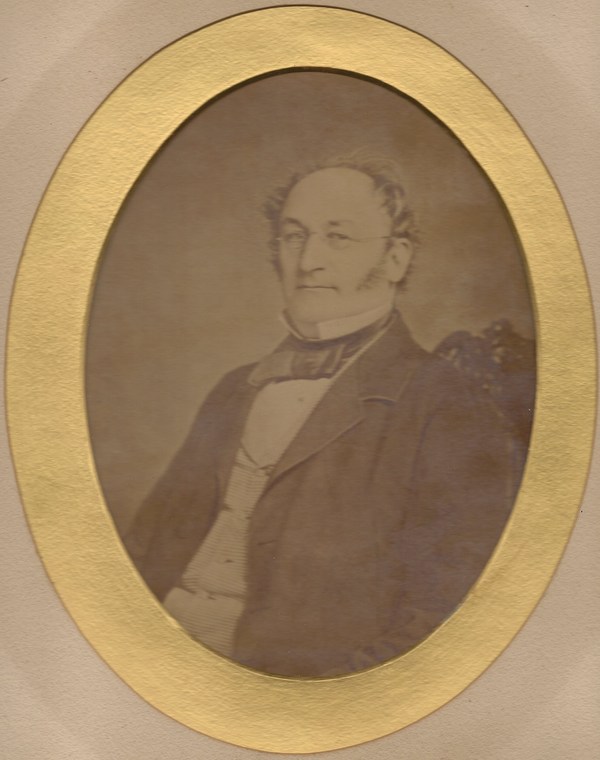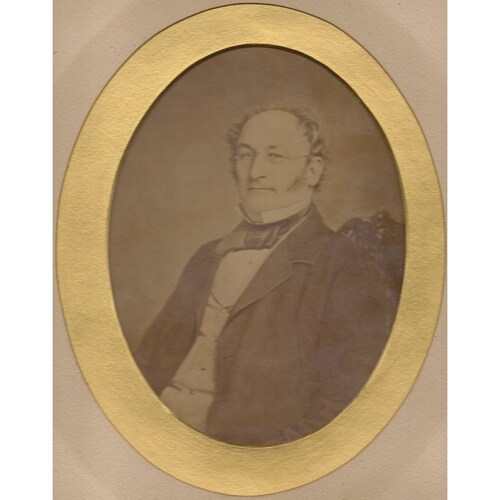
Source: Link
CLARKSON, THOMAS, merchant; b. Susworth, parish of Scotter, Lincolnshire, Eng., 26 Jan. 1802, son of John and Elizabeth Clarkson; d. 4 May 1874, at Toronto, Ont.
Thomas Clarkson apparently emigrated to York (Toronto) in 1832, where he appears as a storekeeper in 1837 and in the 1840s as an auctioneer. He also began in the 1840s to deal in produce and handle goods on commission, specializing in the grain trade; these two types of business were to occupy his attention for the rest of his life For some time prior to the beginning of 1845 he was in partnership with Thomas Brunskill of Thornhill.
Clarkson soon became active in the financial development of the city, where his position does not seem to have been hurt by the fact that he was prepared to accept the presidency of the local Annexation Association in December 1849. He was one of the incorporators of the Toronto Board of Trade in 1845; as its president from 1852 to 1859 he supported reciprocity, pressed for changes in the usury laws, and opposed tariff increases. He was also a founder and president of the Commercial Building and Investment Society (incorporated in 1851), helped establish the Bank of Toronto (and was one of the first directors in 1856–58), and was active in the Toronto Exchange, established in 1854 “for commercial business.” Like many other members of the Board of Trade, Clarkson was closely associated with the unsuccessful Toronto and Georgian Bay Canal Company, chairing, in September 1855, a Toronto meeting of delegates from both Canada and such American centres as Chicago, Milwaukee, and Oswego. In 1856 he appeared at the head of the list of incorporators of the company.
The panic of 1857, with the depression that followed, put a stop to such expensive ventures and led to a general decline in trade. Clarkson’s speech on his retirement as president of the Board of Trade in January 1859 concentrated on the problems of trade in Canada. The next year he moved to Milwaukee, then the centre of a rapidly developing region. There, with his sons Benjamin Reid and Robert Guy (1841–89), he established a produce and commission business known as T. Clarkson and Sons. Thomas and Benjamin returned to Toronto in 1864, but Robert remained in Milwaukee and carried on the business until his death. He became well known through his articles in the Evening Wisconsin, written under the pseudonym Tommy Dodd.
In Toronto Thomas re-established his business which had been discontinued after operating briefly as Clarkson, Hunter and Company. He also became an official assignee in bankruptcy for the province, thus assuming responsibility for the storage and sale of goods of bankrupts. In 1869 he took over the lease of a large grain storage elevator which he renamed Clarkson’s Elevator, and he was active in the Produce Merchants Exchange in the city.
Clarkson was forced to retire in 1872 because of a paralytic stroke. On his death two years later his business was divided: Benjamin, who was already a partner, took over the elevator and grain business; the assignee business passed to his other partners, Thomas Munro and another son, Edward Roper Curzon Clarkson (1852–1931), who later developed the auditing firm which is now Clarkson, Gordon and Company.
An Anglican and parishioner of St James Cathedral, Clarkson was also a sabbatarian. In 1858 he was elected president of a revived Toronto Sabbath Alliance which supported the exemption of civil servants from Sunday work. He was active in the St George’s Society of Toronto and joined the York Pioneer Society in 1871. He married first, Elizabeth Farnham (d. 1829) in 1821, by whom he had two children; secondly, Carrie Brunskill in 1834, after he had come to Canada, by whom he had four children; and thirdly, Sarah Helliwell (1824–78), in 1844, by whom he had ten children. One son, John Brunskill Clarkson (1835–1903), became a Methodist minister, and a grandson, John Reed Teefy, was superior of the Roman Catholic St Michael’s College in Toronto.
PAO, W. H. Merritt papers, 22 Nov. 1854; Toronto city council papers, 6, 18 July 1836. Commercial Herald (Toronto), 6 March 1845. Globe (Toronto), 17 Jan. 1859; 26 June 1860; 21, 28 May 1866. Mail (Toronto), 5, 6 May 1874. “The annexation movement, 1849–50,” ed. A. G. Penny, CHR, V (1924), 236–61. Canada, Province of, Statutes, 1856, c.118. Directory of the city of Milwaukee . . . 1860–61 (Milwaukee, 1860). Milwaukee city directory for 1863 . . . , comp. A. Bailey (Milwaukee, 1863). Edwards’ annual director to . . . the city of Milwaukee for 1865, ed. Richard Edwards (Milwaukee, 1865). Toronto, Directories, 1837–73. The roll of pupils of Upper Canada College, Toronto, January 1830, to June 1916, ed. A. H. Young (Kingston, Ont., 1917), 170–71. [A. J. Little], The story of the firm, 1864–1964: Clarkson, Gordon & Co. (Toronto, 1964), 3–13. Middleton, Municipality of Toronto, I, 488, 504. Joseph Schull, 100 years of banking in Canada: a history of the Toronto-Dominion Bank (Vancouver, Toronto, Montreal, 1958). Douglas McCalla, “The commercial politics of the Toronto Board of Trade, 1850–1860,” CHR, L (1969), 51–67.
Cite This Article
Frederick H. Armstrong, “CLARKSON, THOMAS,” in Dictionary of Canadian Biography, vol. 10, University of Toronto/Université Laval, 2003–, accessed April 23, 2025, https://www.biographi.ca/en/bio/clarkson_thomas_10E.html.
The citation above shows the format for footnotes and endnotes according to the Chicago manual of style (16th edition). Information to be used in other citation formats:
| Permalink: | https://www.biographi.ca/en/bio/clarkson_thomas_10E.html |
| Author of Article: | Frederick H. Armstrong |
| Title of Article: | CLARKSON, THOMAS |
| Publication Name: | Dictionary of Canadian Biography, vol. 10 |
| Publisher: | University of Toronto/Université Laval |
| Year of revision: | 1972 |
| Access Date: | April 23, 2025 |



